

SUBSCRIBE TO OUR FREE NEWSLETTER
Daily news & progressive opinion—funded by the people, not the corporations—delivered straight to your inbox.
5
#000000
#FFFFFF
To donate by check, phone, or other method, see our More Ways to Give page.


Daily news & progressive opinion—funded by the people, not the corporations—delivered straight to your inbox.
Trump also contradicted a US intelligence assessment that Saudi Crown Prince Mohammed bin Salman had ordered the murder of journalist Jamal Khashoggi.
President Donald Trump angrily snapped at ABC News reporter Mary Bruce while taking questions alongside Saudi Crown Prince Mohammed bin Salman in the White House on Tuesday.
The testy exchange began when Bruce tried to ask the crown prince about a US intelligence assessment concluding that he was responsible for the murder of journalist Jamal Khashoggi.
"Who are you with?" Trump demanded to know as Bruce attempted to ask her questions.
"I'm with ABC News, sir," she replied.
"Fake news," Trump said. "ABC, fake news, one of the worst in the business."
Shortly after this, Trump described the slain Khashoggi as "somebody that was extremely controversial."
"A lot of people didn't like that gentleman that you're talking about," Trump said, referring to Khashoggi. "Whether you like him or didn't like him, things happen. But [the crown prince] knew nothing about it. You don't have to embarrass our guest."
In fact, a US intelligence report that was declassified in 2021 concluded that the crown prince personally approved of a plan carried out by Saudi forces to murder Khashoggi after he entered a Saudi consulate in Istanbul, Turkey in 2018.
Shortly after this, Bruce tried to ask the president a question about FBI files related to the late sex offender and longtime Trump friend Jeffrey Epstein, and he again hit her with personal insults.
"It's not the question I mind, it's your attitude," he said. "You're a terrible person and a terrible reporter."
He then threatened to take ABC News completely off the air.
"I think the [broadcast] license should be taken away from ABC because your news is so fake, and it's so wrong," he said. "And we have a great commissioner... who should look at that."
Trump's mention of the "commissioner" was presumably a reference to Federal Communications Commission Chairman Brendan Carr, who earlier this year threatened to pull ABC's broadcast license unless it fired late-night host Jimmy Kimmel, a frequent critic of the president.
Kimmel's show was suspended shortly after Carr made this statement, although he was reinstated days later amid public outcry about government censorship.
"The commercial news media, which helped elevate Trump to power, have proven repeatedly that they are ill-equipped to withstand such pressures," warned one scholar.
As US President Donald Trump late on Sunday lashed out against the American media and threatened to pull broadcasting licenses from networks for their alleged "biased" coverage of him, media experts said the danger to the news media lies partially in corporate outlets' potential capitulation to the Trump administration.
In a post on his Truth Social platform, the president railed against NBC and ABC, which he called "two of the absolute worst and most biased networks anywhere in the world."
He then said the networks should "lose their licenses for their unfair coverage of Republicans and/or conservatives, but at a minimum, they should pay up BIG for having the privilege of using the most valuable airwaves anywhere at anytime!!!"
The president concluded his angry rant by declaring that "crooked 'journalism' should not be rewarded, it should be terminated!!!"
Trump did not point to any specifics regarding his claim that the networks' coverage of him is unfair, but asserted that they "give [him] 97% bad stories."
This is not the first time that Trump has called on the Federal Communications Commission to strip broadcasters' licenses for producing news he doesn't like, although so far no network has had its license revoked by the Federal Communications Commission (FCC).
Even so, some experts were alarmed at Trump's latest attacks, which they feared could lead to more capitulation from major media corporations similar to the $16 million settlement that CBS parent company Paramount agreed to earlier this summer, which stemmed from what experts called a meritless lawsuits over a "60 Minutes" interview with 2024 Democratic presidential candidate Kamala Harris.
Victor Pickard, professor of media policy and political economy at the University of Pennsylvania's Annenberg School for Communication, described the president's angry rants as "yet more worrying signs that Trump knows no limits in exerting dictatorial power over our news media."
"The commercial news media, which helped elevate Trump to power, have proven repeatedly that they are ill-equipped to withstand such pressures since they typically privilege their profit motives over democratic needs," he said. "Some individual journalists have shown much courage despite Trump's attacks, but the corporate media institutions themselves too often capitulate."
Tim Karr, senior director of strategy and communications at Free Press, echoed Pickard's point about the media being responsible for the president's political rise, and he singled out NBC's decision to air Trump's reality TV show, "The Apprentice," which he said gave Americans the false impression that he was a "successful and decisive businessman."
He also expressed concerns that broadcasters would offer the president more concessions in an attempt to avoid retaliation.
"What should be more worrying to anyone who appreciates a free press is the degrees to which these massive media conglomerates are capitulating before the president," he said. "If we've learned anything about the media from the past eight months, it's that massive media companies are far too beholden to the political elite to speak truth to power."
He then accused the major networks of cowering before Trump despite having the First Amendment clearly on their side.
"NBC and ABC are protected under the First Amendment from the sort of government meddling proposed here by Trump—and enacted by his obsequious FCC chairman, Brendan Carr," he said. "The problem is that big media conglomerates like these two would rather cave to the president than stand up for their constitutional rights."
Too many of the president’s alleged adversaries are keeping their head down and trying to stay out of the line of fire. That has to change, and change soon, or they—and we—will all hang separately.
The appalling spectacle of some of the nation’s most prestigious law firms, media companies, and universities surrendering to bully pulpiteer Donald Trump’s extortion brings to mind that quip Benjamin Franklin made at the signing of the Declaration of Independence: “We must all hang together, or assuredly we shall all hang separately.”
Trump’s revenge campaign is just one aspect of his all-out war on democracy—and it’s easy to get distracted by his latest daily outrage—so there’s no blame for not following it closely. The gist of it is, since taking office, Trump has relentlessly attacked his perceived enemies and has brought a significant number of them to heel.
Trump’s crusade should not come as a total surprise. After all, he told his supporters at a March 2023 rally: “For those who have been wronged and betrayed… I am your retribution.” What is shocking is the capitulation rate. One by one, Trump has been picking off his alleged adversaries. To be sure, some are fighting back, but too many are keeping their head down and trying to stay out of the line of fire. That has to change, and change soon, or they—and we—will all hang separately.
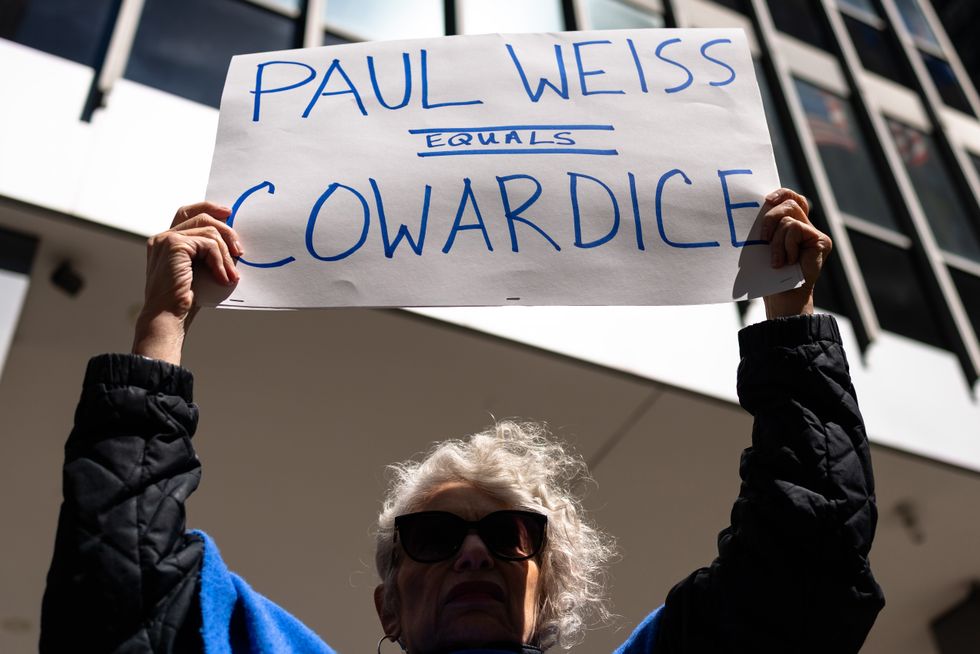
Nine prominent law firms, including Paul Weiss, Skadden Arps, and Latham & Watkins, have struck deals to avoid punitive executive orders Trump issued because they represented clients or took legal positions at odds with his administration. The orders would have revoked the firms’ security clearances, blocked their access to government buildings, and canceled their federal contracts. To get Trump to back down, they agreed to provide a total of $940 million in pro bono legal services to support Trump’s pet causes and eliminate diversity, equity, and inclusion (DEI) considerations in hiring and promotion.
At least four other major law firms, including Perkins Cole and WilmerHale, are resisting. They filed lawsuits arguing that Trump’s executive orders are unconstitutional retaliations that threaten the rule of law and violate First Amendment protections. Judges have issued temporary injunctions to block the executive orders.
Trump has not issued any executive orders against law firms since April, but the threat has had a chilling effect. “Some of the country’s largest law firms have declined to represent clients challenging the Trump administration…,” a recent ProPublica investigation found, “while others have sought to avoid any clients that Trump might perceive as his enemies.”
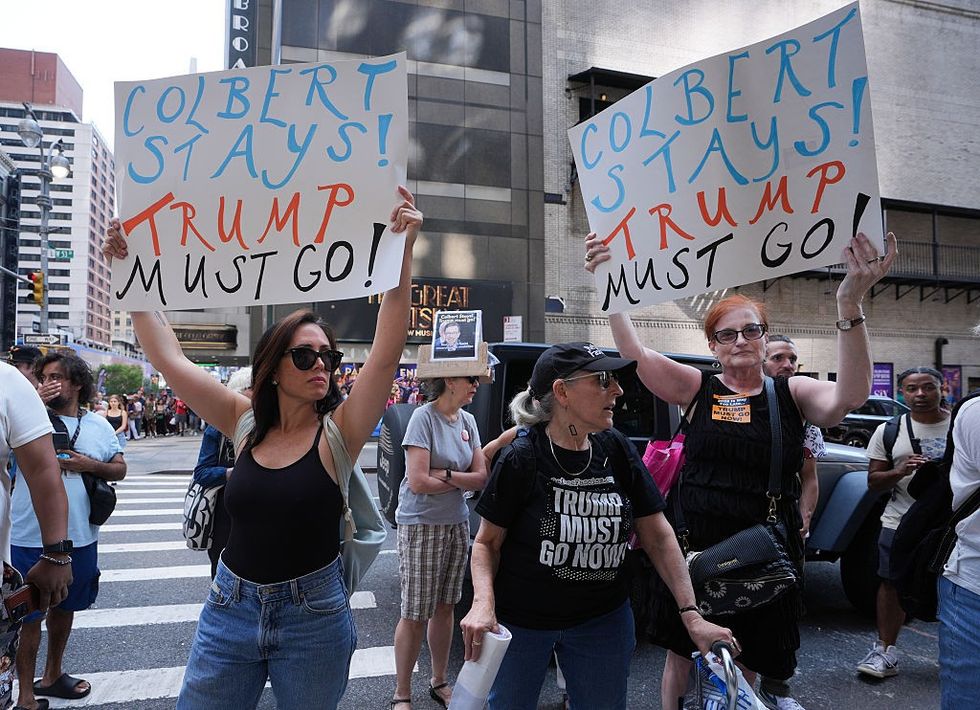
Both ABC News and Paramount, owner of CBS News, crumpled in the face of a meritless Trump lawsuit.
Trump’s case against Disney’s ABC News, which settled last December for $15 million for Trump’s presidential library, largely turned on semantics. Anchor George Stephanopoulos incorrectly stated on air that Trump was found civilly liable for raping writer E. Jean Carroll. In fact, he was found guilty of sexually assaulting (and defaming) Carroll. That said, the judge handling the case said the claim that Trump raped Carroll was “substantially true,” but the term “rape” is narrowly defined by New York state law. At any rate, to win the case, Trump would have had to clearly prove that Stephanopoulos’ comment was false and that he said it with “actual malice”—that he knew it was false or acted with reckless disregard of the truth. Trump would have lost.
Will news organizations now think twice before criticizing Trump? Most likely, yes.
Paramount’s July 2 settlement of $16 million for Trump’s library was tantamount to bribery. Trump sued Paramount for $10 billion last October, alleging that “60 Minutes” deceptively edited an interview with presidential candidate Kamala Harris to make her look good. No matter that editing interviews for time and clarity is what broadcast news organizations do.
Trump did not have a case, but Paramount had a $8.4 billion merger with Skydance, a Hollywood studio, pending before the Federal Communications Commission (FCC)—now chaired by Project 2025 coauthor Brendan Carr—and it didn’t want to antagonize Trump. On July 14, CBS “Late Show” host Stephen Colbert called Paramount’s settlement a “big fat bribe.” The network cancelled his show three days later. On July 24, the FCC approved the merger.
Critics characterized the two settlements as acts of cowardice that threaten press freedom by emboldening frivolous lawsuits. Will news organizations now think twice before criticizing Trump? Most likely, yes.
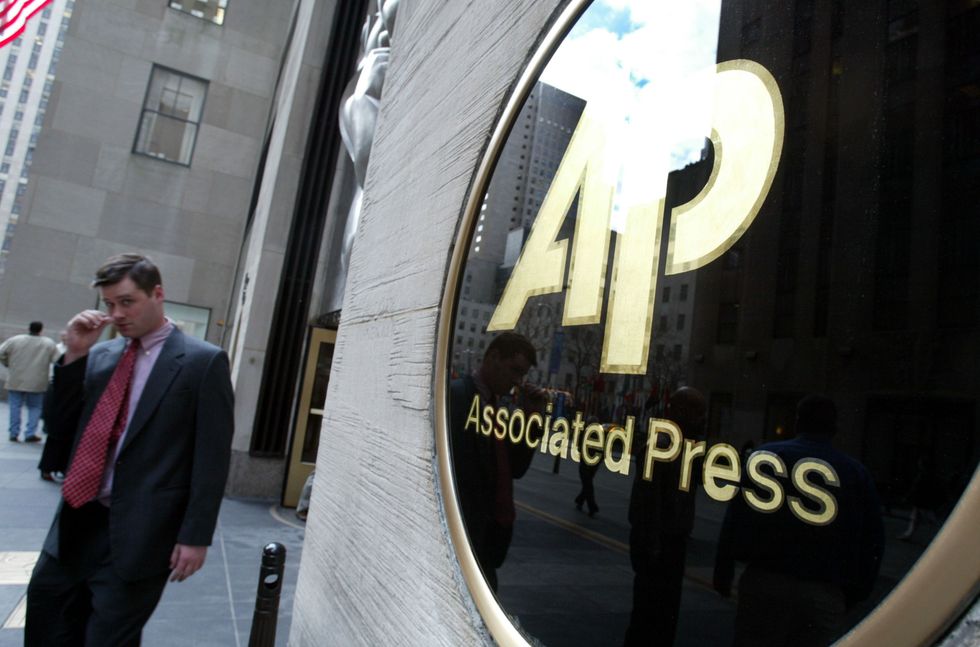
At least a handful of news organizations, including the Associated Press and NPR, have pushed back against Trump’s bullying, but the results were hardly a victory for the First Amendment.
The Associated Press (AP) sued the White House in February for blocking its reporters from Oval Office briefings and Air Force One press pools because the news service didn’t adopt Trump’s new name for the Gulf of Mexico. AP argued banning its reporters violates its First Amendment rights. The case is still tied up in court.
In late April, the Corporation for Public Broadcasting (CPB) sued Trump for firing three of its five board members. In late May, NPR and PBS sued the Trump administration over the executive order to revoke federal funding for public broadcasting. Late last month, Trump signed a bill canceling $1.1 billion in public broadcast funding—which Congress had originally approved—in a “rescission” package, and on August 1, CPB announced it was shutting down.
More recently, Trump filed a $10 billion defamation lawsuit after the Wall Street Journal published a story on a sexually suggestive letter Trump sent to Jeffery Epstein for his 50th birthday. Denying that he had written the letter, Trump sued Rupert Murdoch; News Corp and its CEO, Robert Thomson; Dow Jones & Company; and the reporters who wrote the piece, calling the article “false, malicious, defamatory, FAKE NEWS” on Truth Social. The Journal stands by the story and is prepared to defend it in court.
“There’s nothing inherently wrong with a president bringing a libel suit,” the renowned constitutional lawyer Floyd Abrams told the AP. “But this claim [against the Wall Street Journal] certainly seems like nothing more or less than an effort to suppress speech that our president finds discomforting. That’s not why we have libel law. It’s why we have a First Amendment.”
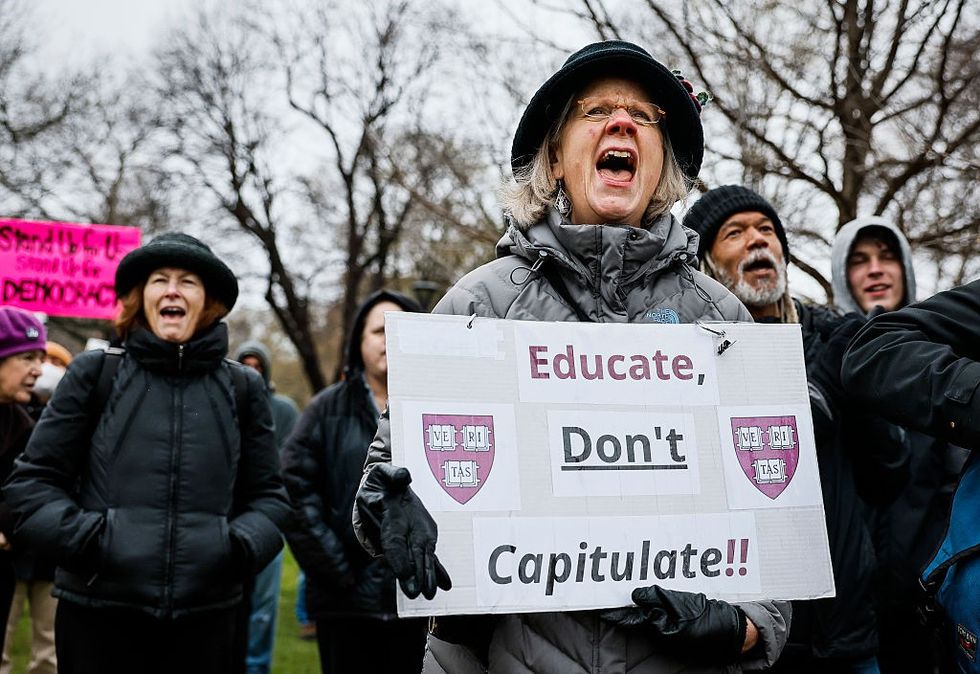
Under the pretext of rooting out antisemitism and DEI programs on campus, Trump has been bludgeoning the most prominent American universities, threatening to cancel their federal research funding unless they change their policies.
On July 23, my alma mater Columbia University and the University of Pennsylvania were the first to capitulate. Columbia did not admit to any wrongdoing, but agreed to pay a $200 million fine; stop considering race in admissions and hiring; share with the federal government applicants’ standardized test scores, grade point averages, and race; and pay an additional $21 million to settle US Equal Employment Opportunity Commission investigations. In return, the school regains access to nearly $1.3 billion in annual federal funding that was placed on hold. Penn settled the same day but did not agree to pay anything. Among other things, it promised to align its athletic department’s policies with the Trump administration’s position banning transgender athletes.
Less than a week later, my other alma mater, Brown University, settled with the administration, agreeing to dismantle DEI programs and spend $50 million over 10 years on Rhode Island workforce development organizations. In return, the administration will reinstate $510 million in federal contracts and grants it threatened to block. Like Columbia, Brown also agreed to share details about its applicants with the federal government. Trump celebrated the agreement with a post on Truth Social proclaiming: “Woke is officially DEAD at Brown.”
In a March interview with the AP, former Trump White House lawyer Ty Cobb said giving in to a bully makes things worse by creating a snowball effect. “
Harvard University, which initially stood up for academic freedom and sued the administration, is reportedly moving toward a settlement requiring the university to pay $500 million to vocational or work force training programs instead of directly to the federal government or Trump’s presidential library. If finalized, the Trump administration would then restore billions of withheld federal dollars to the school for research and other programs.
The administration’s professed rationale for punishing universities because of antisemitism on campus doesn’t pass the smell test. It’s a ruse. It’s all about trying to stamp out perceived leftist ideology and snuff out speech it opposes, according to Trump’s education secretary, Linda McMahon.
In a July 24 interview with Fox Business, McMahon applauded the Columbia settlement as “a monumental victory for conservatives who wanted to do things on these elite campuses for a long time because we had such far left-leaning professors…” “We’re really hopeful,” she added, “this particular settlement agreement is going be a template for other universities to follow.”
Likewise, Vice President JD Vance has made it clear that, in his opinion, “professors are the enemy.” In November 2021, he delivered the keynote address at the National Conservatism Conference in Orlando. He spent 30 minutes railing about corrupt American universities and then closed by quoting Richard Nixon, who he called a “great prophet and statesman.”
“I think in this movement of national conservatism what we need more than inspiration is we need wisdom,” Vance said, “and there is a wisdom in what Richard Nixon said approximately 40 or 50 years ago. He said, and I quote: ‘The professors are the enemy.’” (During that same taped conversation, ironically with former professor Henry Kissinger, Nixon also said “the press is the enemy.”)
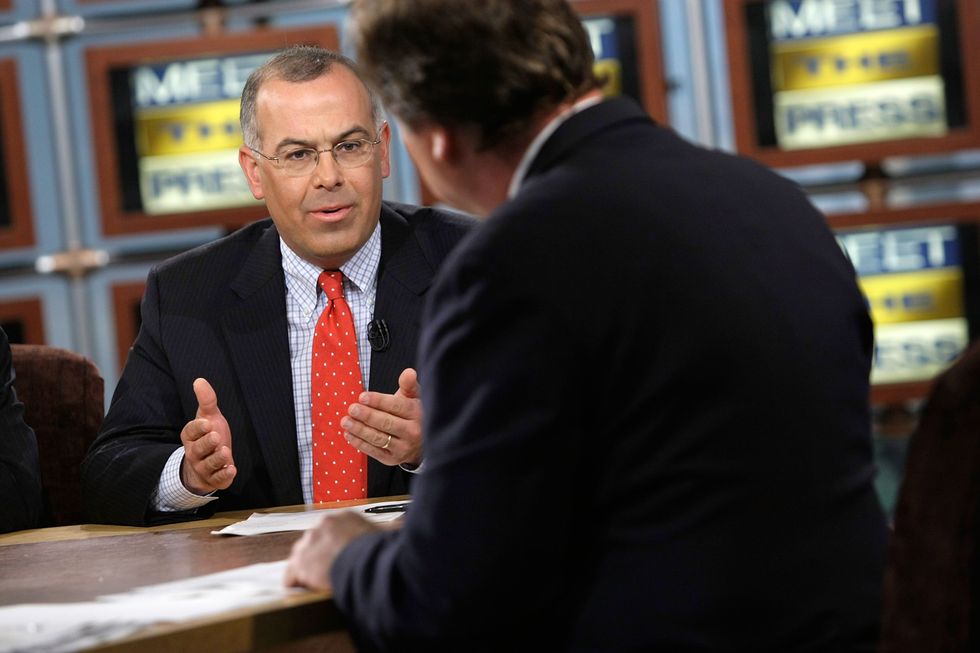
In a March interview with the AP, former Trump White House lawyer Ty Cobb said giving in to a bully makes things worse by creating a snowball effect. “The more of them that cave, the more extortion that that invites,” he said. “You’ll see other universities and other law firms and other ‘enemies’ of Trump assaulted and attacked into submission because of that.”
So, what is to be done?
New York Times columnist David Brooks addressed this question on the “PBS News Hour” during his weekly discussion with MSNBC’s Jonathan Capehart on July 25.
“Well, there are two possible responses,” he said. “One, the one that’s being chosen by most organizational leaders right now, is lay low. It’s so, well, maybe they won’t pick on me, or maybe we will make a concession and they won’t pick on me...”
“The other option, which I thought we were going to have, is a broad coalition, not only of all universities, but all law firms, businesses, nonprofits, foundations, anybody in any sector that could be part of the extortion attempt,” he continued. “And they would say, we will band together. There’s strength of numbers. If they come for one of us, they come for all of us, sort of a domestic NATO Article 5.”
I would take Franklin’s proposition a bit further: It is the first responsibility of every citizen to defy authority when that authority is illegitimate.
I made the exact same argument in my graduation speech at Brown in 1976. I wasn’t talking about how to buck an authoritarian government, I was talking about how to challenge a top-down, undemocratic workplace, but it’s analogous.
The nation’s bicentennial year wasn’t a great time for a recent grad to be looking for a job. Industrial output had rebounded from a slump and corporate profits were up, but the recovery was jobless, and states and municipalities—and colleges—were facing major deficits. Given the scarcity of jobs in academia and the difficulty of earning a living as a solo practitioner, I warned my classmates: “More often than not we will find ourselves in basically undemocratic, hierarchical institutions that are resistant to change. These institutions are characterized by authoritarian control from above, and those who are not in the upper reaches of the hierarchy are excluded from the decision-making process.”
How did Brown prepare us for that future? By providing a taste of it. I cited examples of how, during my time there, Brown acted like any other corporation to protect its interests at the expense of its students, faculty, and workers. And then, like David Brooks, I spelled out the two ways to respond to authoritarians.
The first, I explained that June morning, is the “individual survival” response. One person alone has little chance against an institution, so it makes sense to keep your head down and accept the status quo. (By the same token, one university, one law firm, or one news organization alone has little chance against an authoritarian government.)
The second, more effective way is with a collective, community response. The civil rights, women’s, anti-war, gay, and environmental movements my generation grew up with demonstrated firsthand that united action can lead to positive change. It’s clear that strength comes in numbers, be it in school, the workplace, the voting booth, or the streets.
As mentioned above, 200 years before I gave that speech, Benjamin Franklin said: “We must all hang together, or assuredly we shall all hang separately.” He also pointed out: “It is the first responsibility of every citizen to question authority.”
I would take Franklin’s proposition a bit further: It is the first responsibility of every citizen to defy authority when that authority is illegitimate.
Certainly, there are significant risks to sticking your neck out, but the risks of doing nothing are even greater. If I learned anything during my four years at Brown—and my 40 years in Washington, DC—it’s that democracy is not a spectator sport, and we are all being tested by the worst political crisis of our lifetime.
This article first appeared at the Money Trail blog and is reposted here at Common Dreams with permission.